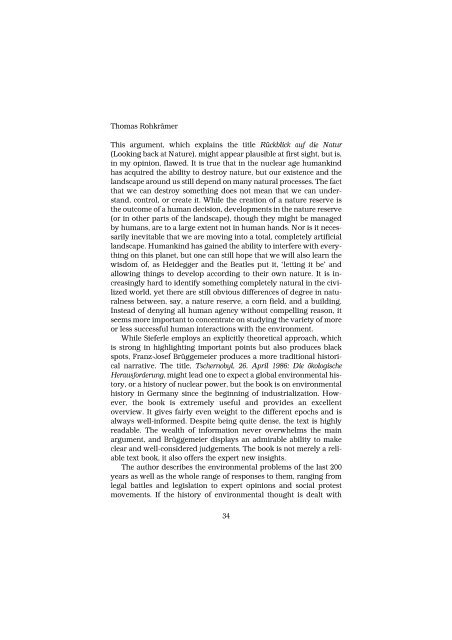Download - German Historical Institute London
Download - German Historical Institute London
Download - German Historical Institute London
You also want an ePaper? Increase the reach of your titles
YUMPU automatically turns print PDFs into web optimized ePapers that Google loves.
Thomas Rohkrämer<br />
This argument, which explains the title Rückblick auf die Natur<br />
(Looking back at Nature), might appear plausible at first sight, but is,<br />
in my opinion, flawed. It is true that in the nuclear age humankind<br />
has acquired the ability to destroy nature, but our existence and the<br />
landscape around us still depend on many natural processes. The fact<br />
that we can destroy something does not mean that we can understand,<br />
control, or create it. While the creation of a nature reserve is<br />
the outcome of a human decision, developments in the nature reserve<br />
(or in other parts of the landscape), though they might be managed<br />
by humans, are to a large extent not in human hands. Nor is it necessarily<br />
inevitable that we are moving into a total, completely artificial<br />
landscape. Humankind has gained the ability to interfere with everything<br />
on this planet, but one can still hope that we will also learn the<br />
wisdom of, as Heidegger and the Beatles put it, ‘letting it be’ and<br />
allowing things to develop according to their own nature. It is increasingly<br />
hard to identify something completely natural in the civilized<br />
world, yet there are still obvious differences of degree in naturalness<br />
between, say, a nature reserve, a corn field, and a building.<br />
Instead of denying all human agency without compelling reason, it<br />
seems more important to concentrate on studying the variety of more<br />
or less successful human interactions with the environment.<br />
While Sieferle employs an explicitly theoretical approach, which<br />
is strong in highlighting important points but also produces black<br />
spots, Franz-Josef Brüggemeier produces a more traditional historical<br />
narrative. The title, Tschernobyl, 26. April 1986: Die ökologische<br />
Herausforderung, might lead one to expect a global environmental history,<br />
or a history of nuclear power, but the book is on environmental<br />
history in <strong>German</strong>y since the beginning of industrialization. However,<br />
the book is extremely useful and provides an excellent<br />
overview. It gives fairly even weight to the different epochs and is<br />
always well-informed. Despite being quite dense, the text is highly<br />
readable. The wealth of information never overwhelms the main<br />
argument, and Brüggemeier displays an admirable ability to make<br />
clear and well-considered judgements. The book is not merely a reliable<br />
text book, it also offers the expert new insights.<br />
The author describes the environmental problems of the last 200<br />
years as well as the whole range of responses to them, ranging from<br />
legal battles and legislation to expert opinions and social protest<br />
movements. If the history of environmental thought is dealt with<br />
34













